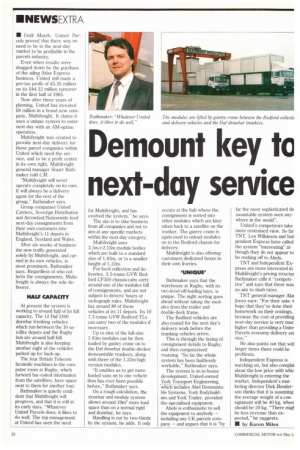emount key to next-day service
Page 22

If you've noticed an error in this article please click here to report it so we can fix it.
• Until March, United Parcels proved that there was no need to be in the next-day market to be profitable in the parcels industry.
Even when results were dragged down by the purchase of the ailing Atlas Express business, United still made a pre-tax profit of £3.25 million on its 244.12 million turnover in the first half of 1985.
Now after three years of planning, United has invested 28 million in a brand new company, Multifreight. It claims it uses a unique system to enter next-day with an AM-option operation.
Multifreight was created to provide next-day delivery for those parcel companies within United which need the service, and to be a profit centre in its own right, Multifreight general manager Stuart Bathmaker told CM.
"Multifreight will never operate completely on its own. It will always be a delivery agent for the rest of the group," Bathmaker says.
Group companies United Carriers, Soverign Distribution and Arrowfast/Nationwide feed next-day consignments from their own customers into Multifreight's 11 depots in England, Scotland and Wales.
After six weeks of business the new traffic generated solely by Multifreight, and carried in its own vehicles, is most prominent, Bathmaker says. Regardless of who collects the consignments, Multifreight is always the sole deliverer.
HALF CAPACITY
At present the system is working to around half of its full capacity. The 12 Daf 2100 drawbar trunking vehicles which run between the 10 satellite depots and the Rugby hub are around half full. Multifreight is also keeping another eight of the vehicles parked up for back-up.
The four British Telecom facsimile machines in the computer room at Rugby, which forward bar-coded information from the satellites, have space next to them for another four.
Bathmaker is quietly confident that Multifreight will progress, and that it is still in its early days. "Whatever United Parcels does, it likes to do well. The top management at United has seen the need for Multifreight, and has evolved the system," he says.
The aim is to take business from all companies and not to aim at any specific markets within the next-day category.
Multifreight uses 2.5m x 2.13m module bodies which are built to a standard size of 1.83m, or to a smaller height of 1.22m.
For local collection and deliveries, 3.5-tonne GVW Bedford CF350 chassis/cabs carry around one of the modules full of consignments, and are not subject to drivers' hours or tachograph rules. Multifreight has around 80 of these vehicles at its 11 depots. Its 10 7.5-tonne GVW Bedford TLs can carry two of the modules if necessary.
Up to nine of the full-size 1.83m modules can be then loaded by gantry crane on to the Daf drawbar double-decker demountable trunkers, along with three of the 1.22m high version modules.
"It enables us to get more loaded vans on to one vehicle than has ever been possible before," Bathmaker says.
On a rough calculation, the drawbar and module system allows around 19m2 more load space than on a normal rigid and drawbar, he says.
Handling is cut by two-thirds by the system, he adds. It only occurs at the hub where the consignment is sorted into other modules which are later taken back to a satellite on the trunker. The gantry crane is again used to unload modules on to the Bedford chassis for delivery.
Multifreight is also offering customers dedicated boxes in their own liveries.
'UNIQUE' Bathmaker says that the warehouse at Rugby, with its two-level off-loading bays, is unique. The night sorting goes ahead without taking the modules from the trailer and double-deck frame.
The Bedford vehicles are also routed for the next day's delivery work before the trwiking vehicles arrive.
This is through the faxing of consignment details to Rugby, and then computerised routeing. "So far the whole system has been faultlessly workable," Bathmaker says.
The system is an in-house development. United-owned York Transport Engineering, which includes Abel Demountable Systems, York Bodybuilders and York Trailer, provided the specialised equipment.
Abels is enthusiastic to sell the equipment to anybody — including any UK parcels company — and argues that it is "by far the most sophisticated de mountable system seen anywhere in the world".
United's competitors take more restrained view. So far TNT, Lex Wilkinson and Inds pendent Express have called the system "interesting" although they do not appear to be rushing off to Abets.
TNT and Independent Express are more interested in Multifreight's pricing structtu Bathmaker calls it "competitive" and says that there was no aim to slash rates.
TNT general manager Alai Jones says: "For their sake v hope that they've done their homework on their costings, because the cost of providing next-day service is very muc higher than providing a Unite Parcels economy delivery set vice."
He also points out that wit] larger items there could be problems.
Independent Express is watching on, but also complai about the low price with whic Multifreight is entering the market. Independent's marketing director Dick Henderson thinks that it is assuming the average weight of a consignrnent will be 40 kg, when should be 20 kg. "There migt be less revenue than expected," he suggests.
• by Karen Miles






































































